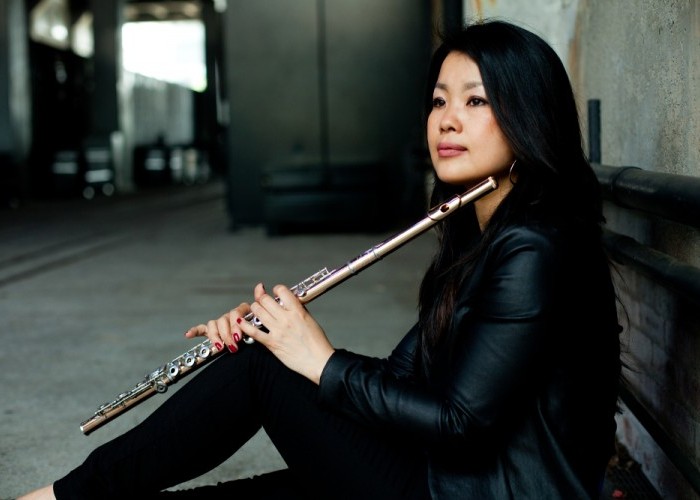Jan 13, 2026 2:09 PM
More Trump-Kennedy Center Cancellations
The fallout from the renaming of the John F. Kennedy Center for the Performing Arts to include President Donald…

Mayu Saeki, who has a new leader project, previously played in Chico Hamilton’s band.
(Photo: Gulnara Khamatova)Mayu Saeki moved from her native Japan to New York in 2009, carrying little but her flutes and the fervent hope of playing jazz. Three months later, she was doing just that. A musician she had befriended brought her to drummer Chico Hamilton’s weekly jam, where her talents immediately stood out.
“Right after we played, Chico called his manager in Los Angeles and told him, ‘We have a flute player,’” Saeki said over tea in a Manhattan patisserie. Not long after that, she appeared in her first New York show—a trial-by-fire gig with Hamilton at the Jazz Gallery—and pulled it off. Ultimately, she held the flute chair in Hamilton’s sextet until his death in 2013.
During her tenure with the band, Saeki appeared on the three albums Hamilton recorded, all on the Joyous Shout! label: Euphoric, Revelation (both released in 2011) and The Inquiring Mind (released posthumously in 2014). Those albums set the stage for Saeki’s debut recording, Hope (Brooklyn Jazz Underground), recorded in September 2015 and released on March 16.
“If I didn’t have these CDs,” she said of the Hamilton recordings, “I couldn’t have made my own CD. I got ideas of what I play music for—why I’m in New York, why I play jazz, what I can offer to people who love the music.”
What she offers, said pianist Aaron Goldberg, who appears on three of the six tunes on the album, is a “rich, beautiful sound,” colored by the hardships of a peripatetic upbringing in Hiroshima and other Japanese cities. “She’s a soulful person, with deep feeling, and you hear that in her playing.”
Of the six tracks on the album, none is more heartfelt than her arrangement of “Soshu-Yakyoku.” It’s a love song from the 1940s that deals with the fraught relationship between the Chinese and Japanese cultures. On it, Saeki improvises an intro and outro on the shinobue, a traditional Japanese flute, with a poignant dose of melancholy.
“The song comes from my soul,” she said.
Equally soulful—but coming from a different place, geographically—are “Libertango” and “Oblivion.” Both tunes, by Argentine tango master Astor Piazzolla, are set in a jazz environment, with pianist Nori Ochiai joining bassist Joe Sanders and drummer John Davis in the rhythm section. But the environment is not allowed to obscure Piazzolla’s melodies, which Saeki, on flute and piccolo for “Oblivion,” articulates with a delicate clarity.
A respect for melody is present throughout the album, not least on the three tunes Saeki wrote that Hamilton included on his albums: “Dilemma,” “Do You Know … ?” and the title track, a spirited waltz on which her shimmering vibrato and sweeping glissandi display an easy confidence that reflects her years of classical training in Japan.
When recording her own tunes, Saeki took an approach that was different from Hamilton’s. The piano replaces the guitar, rendering the harmonic environment a more percussive one. Gone also are the saxophones, leaving the flute as the undisputed melodic lead.
And banished are the rigid time constraints. On The Inquiring Mind, “Hope” runs less than three minutes, with no flute solo; on Hope, it runs more than seven—allowing Saeki’s voice a full measure of expression.
Saeki’s live performances of the music have been well received, from New York’s Kitano (in 2011 and 2013) to The Nash in Phoenix. Saeki is anticipating a return to both clubs leading her own band and performing in a duo with Warren Wolf on piano at An Die Musik in Baltimore. More preliminarily, she’s looking toward making an album with strings. “I have a lot of things to say,” she said. DB

Belá Fleck during an interview with Fredrika Whitfield on CNN.
Jan 13, 2026 2:09 PM
The fallout from the renaming of the John F. Kennedy Center for the Performing Arts to include President Donald…

Peplowski first came to prominence in legacy swing bands, including the final iteration of the Benny Goodman Orchestra, before beginning a solo career in the late 1980s.
Feb 3, 2026 12:10 AM
Ken Peplowski, a clarinetist and tenor saxophonist who straddled the worlds of traditional and modern jazz, died Feb. 2…

The success of Oregon’s first album, 1971’s Music Of Another Present Era, allowed Towner to establish a solo career.
Jan 19, 2026 5:02 PM
Ralph Towner, a guitarist and composer who blended multiple genres, including jazz — and throughout them all remained…

Rico’s Anti-Microbial Instrument Swab
Jan 19, 2026 2:48 PM
With this year’s NAMM Show right around the corner, we can look forward to plenty of new and innovative instruments…

Richie Beirach was particularly renowned for his approach to chromatic harmony, which he used to improvise reharmonizations of originals and standards.
Jan 27, 2026 11:19 AM
Richie Beirach, a pianist and composer who channeled a knowledge of modern classical music into his jazz practice,…